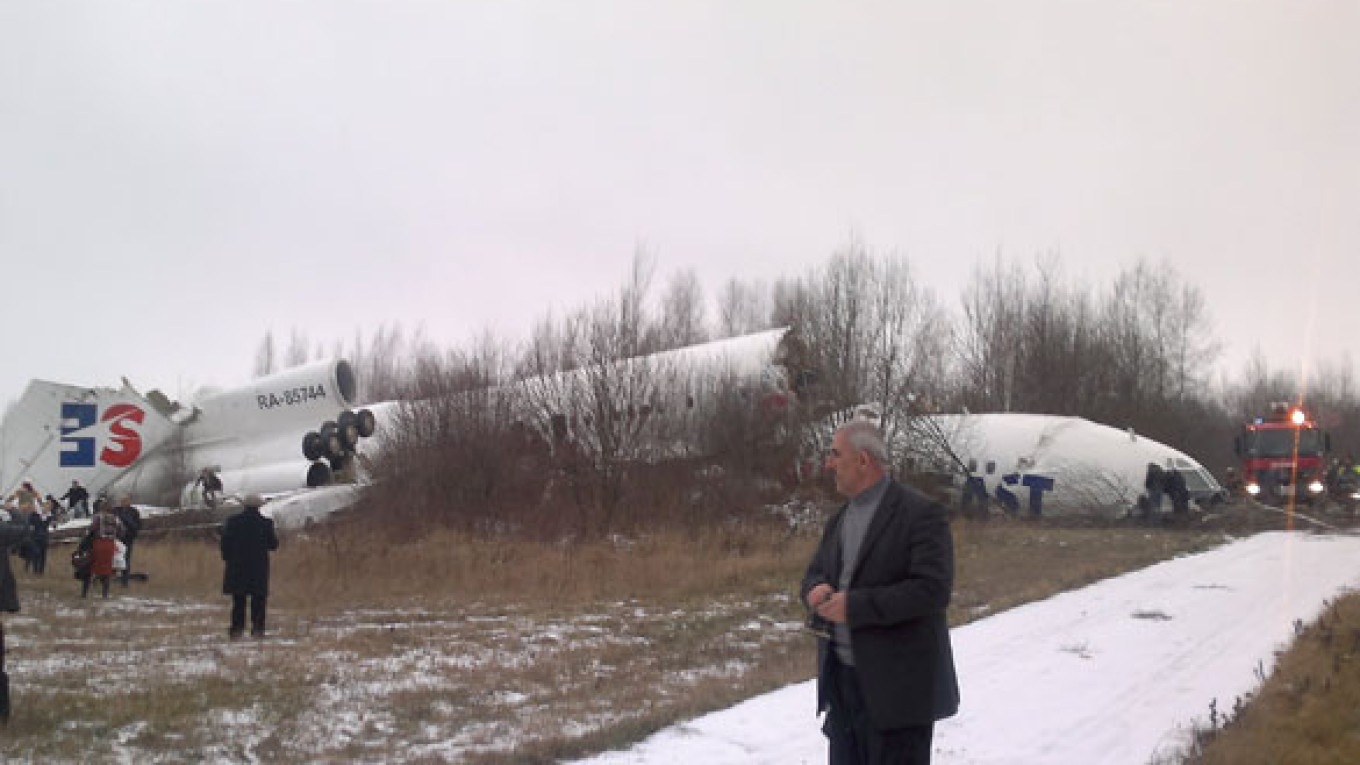An airplane flying out of Vnukovo Airport on Saturday had engine failure shortly after takeoff and made an emergency landing at Domodedovo Airport, killing two people and injuring 83.
Two engines failed on the passenger jet after it took off at about 3 p.m. Saturday, and the plane made the emergency landing as its third engine cut out, skidding off the snowy runway and breaking into sections, officials said.
The plane, a Tupolev Tu-154 belonging to Dagestan Airlines, was carrying at least 155 people when it landed at Domodedovo, said a spokesman for the Federal Air Transportation Agency, Sergei Izvolsky.
The cause of the engine failure was unclear, Izvolsky said. But recent crashes involving the aging Tu-154 aircraft have prompted the Russian carrier Aeroflot to stop using it.
Officials said 155 people were aboard the Dagestan Airlines plane, but the Emergency Situations Ministry said in a web site statement that the aircraft was carrying 168 passengers and eight crew members.
The plane had taken off from another Moscow hub, Vnukovo, and was en route to Makhachkala, the capital of Dagestan, officials said. Federal aviation agency spokesman Sergei Izvolsky said the pilot received signals that engines had cut out about 80 kilometers into the flight at an altitude of 9,100 meters and requested an emergency landing at Domodedovo.
Federal officials said two people were killed, and Health and Social Development Minister Tatyana Golikova said in a web site statement that 83 injured people were taken to five hospitals.
The Investigative Committee said in a website statement that two engines had initially cut out.
The committee said on its web site that "the plane wheeled off the runway and broke up after jumping up on uneven ground."
A previous statement by the Investigative Committee had said the plane slammed into buildings after touching down.
Passenger Vitaly Chumak was quoted by Interfax as saying the plane broke into three parts after landing and barely missed a fence.
In September, a Tu-154 airliner was carrying 72 passengers and nine crew when it suffered an electrical system failure while flying from the northern Siberian town of Polyarnyi to Moscow. President Dmitry Medvedev bestowed awards on the pilot, who landed the plane and avoided casualties, despite rolling into a forest outside an abandoned military base.
The Tu-154 has been the workhorse of both Soviet and post-Soviet civilian aviation, first entering service in the 1970s. But after a series of crashes involving the aging fleet raised safety concerns, flagship carrier Aeroflot recently withdrew all of its Tu-154s from service, with the last flight in January.
The midrange jet remains, however, the mainstay of smaller airlines across Russia and the former Soviet Union. It is banned from parts of Europe because of its excessive engine noise.
The plane that crashed in heavy fog earlier this year, killing Polish President Lech Kaczynski, also was a Tu-154.
On Saturday, Domodedovo Airport switched scheduled flights to a second runway, and normal service wasn't affected, officials said in televised comments.
A Message from The Moscow Times:
Dear readers,
We are facing unprecedented challenges. Russia's Prosecutor General's Office has designated The Moscow Times as an "undesirable" organization, criminalizing our work and putting our staff at risk of prosecution. This follows our earlier unjust labeling as a "foreign agent."
These actions are direct attempts to silence independent journalism in Russia. The authorities claim our work "discredits the decisions of the Russian leadership." We see things differently: we strive to provide accurate, unbiased reporting on Russia.
We, the journalists of The Moscow Times, refuse to be silenced. But to continue our work, we need your help.
Your support, no matter how small, makes a world of difference. If you can, please support us monthly starting from just $2. It's quick to set up, and every contribution makes a significant impact.
By supporting The Moscow Times, you're defending open, independent journalism in the face of repression. Thank you for standing with us.
Remind me later.


